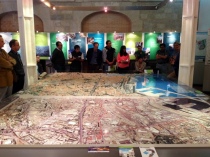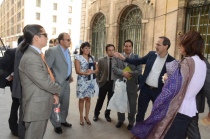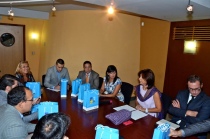In September/October 2014, an Ecuadorian delegation composed by representatives of local/intermediate governments, their associations and the national government conducted a mission in Europe for the exchange of good practices and innovations around economic transformation with various European territories - Bilbao / Basque Country, Marseille, Milan and Barcelona.
This mission is part of the Innovation in Sustainable Territorial Partnerships (ISTEPS) initiative promoted by the UNDP ART Initiative, which in Ecuador focuses on supporting the ongoing process of transformation of the production model of the Ecuadorian economy, identified as a cooperation priority by the Ecuadorian and European territories during the formulation mission in May 2014.
In this context, the territorial cooperation between counterparts from Ecuador and Europe aims at establishing long-lasting partnerships for the exchange of knowledge, innovations and best practices that can enrich the Ecuadorian local governance and local development processes through a concrete strategy that articulates the local, national and global dimensions. In each city, the Ecuadorian delegation had the opportunity to see firsthand the fundamentals of economic transformation and the current economic model of each European territory, visiting institutions, exchanging with key stakeholders, and discussing mechanisms, instruments and indicators used.
In Bilbao / Basque Country, through the facilitation of the Municipality of Bilbao and the Agency for Development Cooperation of the Government of the Basque Country, the exchanges focused on the recent experience and future challenges of the overall economic and social transformation of the Basque Country, as well as the revitalization of metropolitan Bilbao. Firstly, the delegates were briefed about the Basque environmental policy for sustainable development, with emphasis on rural and water management. The delegates then visited the Arkaute Agricultural Technological Center, where the Basque agricultural and livestock ecosystem was presented, with discussions with the HAZI Foundation for competitiveness development and promotion in the primary sector, the ELIKA Basque Foundation for Food Security and the technological center NEIKER-TECNALIA. The delegation also had the opportunity to learn about the promotion of innovation and technology by visiting the Zamudio Technology Park, as well as strategies for tourism promotion. The Ecuadorian representatives met with numerous socio-economic and cultural agents of the Basque Country with interest in developing relations in Ecuador.
In Marseille, thanks to the facilitation of the Municipality of Marseille, the discussions focused on the experience of urban transformation of the Euroméditérranée project, the largest urban renewal project in France, with special attention to its governance linking different levels of government and public –private actors. Another focus of the exchanges was the support to business and employment creation, visiting the skills and jobs development regional agency Cité des Métiers de Marseille and Provence Alpes Côte d'Azur, the Marseille microcredit initiative Métropole and the business incubator Cosens.
In Milan, thanks to the support of the Municipality of Milan, the delegation discussed issues related to the internationalization of the territories with the International Relations Agency of the municipality, learnt about the urban transformation of the municipal territory and discovered the experience of public-private coordination around the EXPO 2015. Some members of the delegation also participated in the event on the Localization of the post-2015 agenda, the role of foundations, organized by the Cariplo Foundation, presenting the experience of the broad territorial consultations held in Ecuador around the post-2015 development agenda. The delegates also visited the Lodi Tecnological Park of Padano and the Agricultural Park of south of Milan, to learn about technological development and entrepreneurship applied to food security and food processing, and visited the Milan Transport Agency, where they exchanged around aspects of urban mobility.
In the last stop of the mission in Barcelona, thanks to the facilitation of the Municipality of Barcelona, a representative of the Agency for Cooperation and Investment of Medellin and Metropolitan Area joined the delegation, under a logic of promoting South-South and triangular cooperation; also representatives of the CIDOB Research Center provided an academic perspective to the discussions. The extended delegation first visited Barcelona ACTIVA, where they learnt about the transformation of the Barcelona economy and discussed about policies to promote and attract investment and talent, support entrepreneurship and business incubators. The delegates then exchanged with the Barcelona Metropolitan Transports, with emphasis on new technologies and new transportation fuels (electricity, hydrogen) and with the Public Health Agency of Barcelona, visiting the reference laboratory for the Control of Food Security in Barcelona. There was also the opportunity to meet and exchange with the renowned business school ESADE, in particular its Institute of Public Governance and Management and its PARTNERS program focused on public-private cooperation.
The final workshop of evaluation and conclusions of the mission was held in Barcelona, with the participation of representatives of Ecuador, Medellin, the host cities, CIDOB, and other interested institutions. The workshop served to summarize the main priority lines and agreements that will be the subject of specific cooperation in the next steps of this dialogue between territories. The Ecuadorian national representatives stressed as elements of interest the thematic of public-private partnerships, the triple helix management (university, industry, government), and best practices of efficient public services.
The Carchi Province highlighted aspects related to:
1) technology transfer and advise on the agro-industrialization process;
2) support to establish a business incubator in the province; 3) exchange of experiences and technical training of local administrators through internships in European on issues related to economic development, production, agribusiness and technological development and
4) exchange and transfer of experiences on mechanisms for promoting public - private partnerships and between levels of government. The province of Esmeraldas prioritized the exchange and transfer of experiences in:
- public-private partnerships to promote agribusiness and value chains, with a focus on creating an agro-industrial park;
- promotion of an entrepreneurial culture and the establishment of business incubators and
- tourism promotion and territorial marketing. With the municipality of Cuenca it was agreed to deepen technical exchanges regarding:
a) city strategic vision and planning;
b) urban mobility and sustainable transport systems;
c) internationalization and
d) development of the city as a cultural hub promoting innovation.
During the workshop, the different Ecuadorian territories and the national government appreciated the efforts of the European territories and actors, as well as the facilitation and support of the UNDP ART Programme. They emphasized the richness of contents and of the experiences visited, considered very useful to inform the processes of transformation of the local economy and governance in Ecuador. The conclusions stressed that this process is a continuous and permanent dialogue between territories that are transforming themselves, creating exchanges between institutions and actors of these territories, allowing to focus on some key actions.











